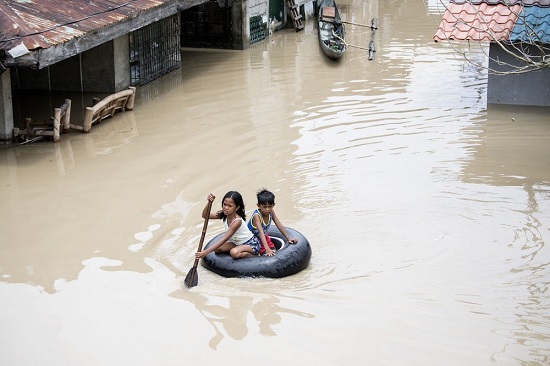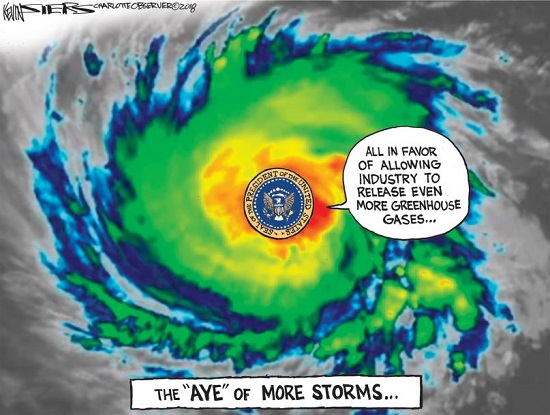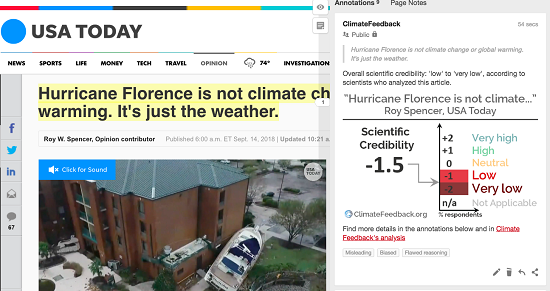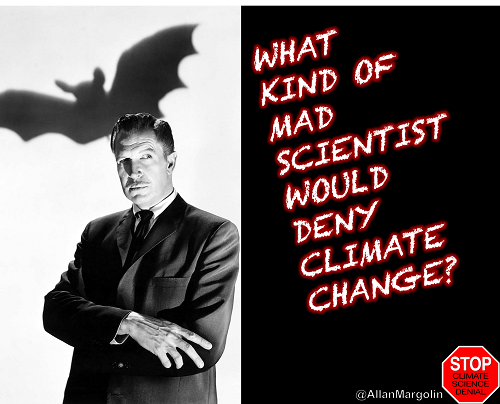
Call to Acton... Storyline of the Week... Must-Read Analysis... Opinion of the Week... Toon of the Week... Quote of the Week... SkS Spotlights... Video of the Week... Reports of Note... Coming Soon on SkS... Climate Feedback Reviews... SkS Week in Review... Poster of the Week...
As you may be aware, the US 2018 Mid-term election will be one of the most historically important elections in American history. Thus, we are embarking on an effort to update the SkS resource, Climate Myths from Politicians. If you are aware that a candidate for the US Congress or the US Senate has made a statement, or statements, about man-made climate change, please share those statements with us in the comment thread of this post. Be sure to properly document the source of each statement.
Hurricane Florence and Super Typhoon Mangkhut laid bare the disproportionate consequences for poor communities.

Two massive tropical cyclones made landfall on separate ends of the globe on Friday. But they were, as the Associated Press put it, “as different as water and wind.”
The wind storm was Super Typhoon Mangkhut. Deemed the strongest cyclone of 2018, it brought 165 mile-per-hour gusts and 20-foot storm surges to the Philippines, and a bit less of both to Hong Kong. The water storm was Hurricane Florence. The slow-moving storm brought only 90 mile-per-hour winds to North and South Carolina, but also torrential rainfall that set a record for both states.
These differences illustrate what one disaster preparedness expert told me last week. “Every single storm has its own identity, its own footprint,” he said. “No two are ever alike.” But cyclones’ identities are not just shaped by wind speeds and rainfall totals. They’re defined by the communities they target.
The Unequal Burden of Climate Change by Emily Atkin, The New Republic, Sep 18, 2018
Three papers have been recently published that lead to the conclusion that human-induced climate change poses a much more urgent and serious threat to life on Earth than many have thought who have been relying primarily on the conclusions of the Intergovernmental Panel on Climate Change (IPCC). This paper first reviews these papers and then examine the ethical questions by the issues discussed in these papers.
New Evidence That Climate Change Poses a Much Greater Threat to Humanity Than Recently Understood Because the IPCC has been Systematically Underestimating Climate Change Risks: An Ethical Analysis by Donald Brown, Ethics & Climate, Widener University, Sep 21, 2018
Hurricane Florence has drenched eastern North Carolina with more than 30 inches of rain, an all-time record for the state. Last year, Hurricane Harvey stalled over Houston and dumped more than 60 inches of rain, an all-time record for the whole country. Also last year, Hurricane Maria ravaged the island of Puerto Rico and caused, according to an independent study, nearly 3,000 deaths.
Welcome to the new normal.
Tropical cyclones are nothing new, of course. But climate scientists say that global warming should make such storms wetter, slower and more intense — which is exactly what seems to be happening. And if we fail to act, these kinds of devastating weather events will likely become even more frequent and more severe
Climate change is real. Welcome to the new normal., Opinion by Eugene Robinson, Washington Post, My 18, 2018

SAN FRANCISCO — It was a big act, one of the last in the final days of a long political career, and it was about one of his life’s passions: safeguarding the environment.
Jerry Brown, 80, the four-term governor of California who is to retire in January, was the principal organizer and reluctant star of the Global Climate Action Summit, a high-octane gathering of lawmakers, executives and scientists working to beat back global warming.
But even as he sought to rally other politicians to the cause, Governor Brown’s conference underscored the limits of what politicians can do to avert the most catastrophic effects of climate change — even the politician who leads California, the wealthiest state in the country and the world’s fifth-largest economy.
“We can spread it, encourage it. I’ll try to do that,” he said in an interview in his office in the State Capitol in Sacramento. “But at the end of the day, this takes a conversion. It’s almost a quasi-religious transformation that has not occurred but must occur. Or the world will pay a very heavy price in life and economic detriment.”
Jerry Brown Made Climate Change His Issue. Now, He’s Not Sure How Much Politicians Can Do. by Somini Sengupta, Climate, New York Times, Sep 18, 2018
Bringing Science to the Conversation
The Metcalf Institute has been fostering informed public conversations about environmental issues by conducting science training for journalists and communication training for scientists for 20 years. Based in the URI College of the Environment and Life Sciences, the Metcalf Institute collaborates with academics, state and federal agencies, non-profits, businesses, community representatives and news organizations nationwide to develop customized programs and resources that improve and expand news coverage of environmental topics. Metcalf has become a global leader in professional development, training 1,800 journalists, scientists, and environmental communicators since our first training in 1999. Our successful training model has a significant multiplier effect, helping millions of news consumers worldwide access high-quality environmental news coverage that relates environmental science to their daily lives, and sparking essential conversations about challenging issues.
Metcalf Institute’s Mission
The mission of Metcalf Institute is to expand accurate environmental news coverage through innovative training and resources for journalists, researchers, and other science communicators to engage more people in discourse about science and the environment.

Climate Feedback asked a team of scientists to review the op-ed, Hurricane Florence is not climate change or global warming. It's just the weather. by Roy W Spencer, USA Today, Sep 14, 2018.
Four scientists analyzed the article and estimated its overall scientific credibility to be ‘low’ to ‘very low’.
A majority of reviewers tagged the article as: Biased, Flawed reasoning, Misleading.
Review Summary
This op-ed in USA Today makes the claim that Hurricane Florence has no appreciable contribution from human-caused climate change.
Scientists who reviewed the article found that it ignores the evidence for trends in tropical cyclone behavior, including slower movement speed and more intense rainfall. Additionally, sea level rise raised the storm surge of the landfalling tropical cyclone above the level it would have reached a century ago. The article cherry-picks data in misleading way to claim that recent storms are no different from past tropical cyclones, but does not provide the analysis necessary to support this claim.
Published research on the topic does, in fact, show that climate change affects tropical cyclones like Florence. While it is unpublished and preliminary, an early analysis by researchers at Stony Brook University and Lawrence Berkeley National Laboratory suggested human-induced warming could have increased Florence precipitation near its maximum by up to 50%, and more extensive research showed it contributed 15%[1] to 20%[2,3] increased rainfall for Hurricane Harvey. This is due to the fact that warmer air can hold more water vapor[4], which increases hurricanes intensity and rainfall.
USA Today op-ed ignores evidence to claim climate change had no role in Hurricane Florence, Edited by Scott Johnson, Climate Feedback, Sep 17, 2018

Posted by John Hartz on Sunday, 23 September, 2018
 |
The Skeptical Science website by Skeptical Science is licensed under a Creative Commons Attribution 3.0 Unported License. |